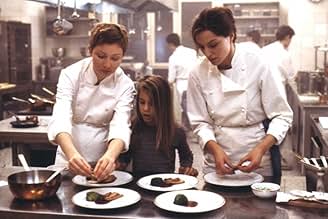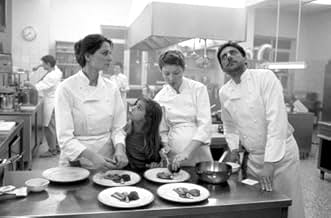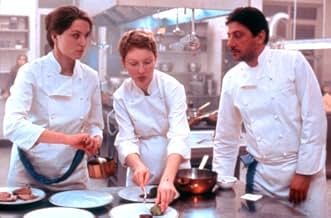PUNTUACIÓN EN IMDb
7,2/10
8,7 mil
TU PUNTUACIÓN
Añade un argumento en tu idiomaWhen a headstrong chef takes charge of her equally stubborn 8-year-old niece, the tensions between them mount... until an Italian sous-chef arrives to lighten the mood.When a headstrong chef takes charge of her equally stubborn 8-year-old niece, the tensions between them mount... until an Italian sous-chef arrives to lighten the mood.When a headstrong chef takes charge of her equally stubborn 8-year-old niece, the tensions between them mount... until an Italian sous-chef arrives to lighten the mood.
- Premios
- 14 premios y 7 nominaciones en total
Wolf-Dietrich Sprenger
- Lauter Gast
- (as W.D. Sprenger)
Victoria Trauttmansdorff
- Begleiterin
- (as Victoria von Trautmannsdorf)
Jerome Ducornau
- Jean
- (as Jerome Ducournau)
Argumento
¿Sabías que...?
- CuriosidadesSergio Castellitto's German wasn't good enough so Frank Glaubrecht was brought in to dub his voice for the German version.
- PifiasWhen Mario and Lina get ready to cook dinner at Martha's apartment, Lina puts on her apron twice.
- ConexionesFeatured in Le cinéma passe à table (2005)
- Banda sonoraCountry
Written by Keith Jarrett
Performed by Keith Jarrett, Jan Garbarek, Palle Danielsson, Jørn Christensen
ECM Records
Reseña destacada
(spoiler regarding the general plot)
Bella Martha reminds me of About A Boy, the "no man is an island" aspect of it. In some ways, Martha is like the guy played by Hugh Grant. The difference though is that while he apparently is really happy about the state of affairs, i.e. the isolation, she is not (even if she may not be fully aware of her own unhappiness). She has to visit a therapist regularly, although she claims that this is purely on instruction of her boss. I call this visit the first of the four "relationships" just to make the number sound more interesting.
The other three relationship all start to develop quite early in the film. First, a neighbour moves in, a gentlemanly engineer called Sam. Then in her "office" i.e. the kitchen of a restaurant where she is the chef, a chap called Mario is brought in by her boss as temporary relief for her assistant on maternity leave. Finally, death of her single-parent sister in an accident left her taking care of her eight-year-old niece Lina while they search her father in Italy.
The first half of the film developed these three relationships along the two fronts: home and office. Soon, it is clear that Sam's role is not really significant, serving just as a dependable friend and emergency-baby-sitter. On the other hand, rocky starts of the other two relationships smooth out as the two fronts merge. Lina comes to the restaurant kitchen in the evenings, becoming a darling there, while Mario becomes a family friend and Lina's buddy, and the three look just like a family. We begin to see smiles on Martha's face.
As in similar movies, just after the mid-point, when characters are well developed and things go nicely, conflicts occur. What I found is that the hostility of Lina towards Martha is less than convincing, even if we take into account her possible rejection of Martha as a mother-substitution. The eventual reconciliation also comes a little too easily. The other conflicts, on which I won't go into details, are not that well developed.
But that is exactly the main point. This is not a Hollywood movie with the standard formula of powerful dramatic conflicts and climatic tear-jerking conclusions. This point is well made when we see the ending of the story given to us quite casually as part of the credit roll. Oh yes, there's a concluding scene with the therapist, reminding us of the sense of humour that comes as part of the film.
Smooth jazz (not sure if that's the right terminology) has been used throughout the film, at the right times, enhancing it rather than distracting from it.
Finally, I really love the scenes in the kitchen which is Martha's entire universe at the beginning of the film, as well as where her reconciliation with both Mario and Lina first takes place. The story aside, I really enjoy the operation in the kitchen, which is the exact opposite to the mass production lines brought about by the industrial revolution. Here, in Martha's kitchen, things are done with what I can only describe as artistic flair.
Bella Martha reminds me of About A Boy, the "no man is an island" aspect of it. In some ways, Martha is like the guy played by Hugh Grant. The difference though is that while he apparently is really happy about the state of affairs, i.e. the isolation, she is not (even if she may not be fully aware of her own unhappiness). She has to visit a therapist regularly, although she claims that this is purely on instruction of her boss. I call this visit the first of the four "relationships" just to make the number sound more interesting.
The other three relationship all start to develop quite early in the film. First, a neighbour moves in, a gentlemanly engineer called Sam. Then in her "office" i.e. the kitchen of a restaurant where she is the chef, a chap called Mario is brought in by her boss as temporary relief for her assistant on maternity leave. Finally, death of her single-parent sister in an accident left her taking care of her eight-year-old niece Lina while they search her father in Italy.
The first half of the film developed these three relationships along the two fronts: home and office. Soon, it is clear that Sam's role is not really significant, serving just as a dependable friend and emergency-baby-sitter. On the other hand, rocky starts of the other two relationships smooth out as the two fronts merge. Lina comes to the restaurant kitchen in the evenings, becoming a darling there, while Mario becomes a family friend and Lina's buddy, and the three look just like a family. We begin to see smiles on Martha's face.
As in similar movies, just after the mid-point, when characters are well developed and things go nicely, conflicts occur. What I found is that the hostility of Lina towards Martha is less than convincing, even if we take into account her possible rejection of Martha as a mother-substitution. The eventual reconciliation also comes a little too easily. The other conflicts, on which I won't go into details, are not that well developed.
But that is exactly the main point. This is not a Hollywood movie with the standard formula of powerful dramatic conflicts and climatic tear-jerking conclusions. This point is well made when we see the ending of the story given to us quite casually as part of the credit roll. Oh yes, there's a concluding scene with the therapist, reminding us of the sense of humour that comes as part of the film.
Smooth jazz (not sure if that's the right terminology) has been used throughout the film, at the right times, enhancing it rather than distracting from it.
Finally, I really love the scenes in the kitchen which is Martha's entire universe at the beginning of the film, as well as where her reconciliation with both Mario and Lina first takes place. The story aside, I really enjoy the operation in the kitchen, which is the exact opposite to the mass production lines brought about by the industrial revolution. Here, in Martha's kitchen, things are done with what I can only describe as artistic flair.
- harry_tk_yung
- 22 feb 2003
- Enlace permanente
Selecciones populares
Inicia sesión para calificar y añadir a tu lista para recibir recomendaciones personalizadas
- How long is Mostly Martha?Con tecnología de Alexa
Detalles
Taquilla
- Recaudación en Estados Unidos y Canadá
- 4.160.475 US$
- Fin de semana de estreno en EE. UU. y Canadá
- 40.446 US$
- 18 ago 2002
- Recaudación en todo el mundo
- 9.852.022 US$
- Duración1 hora 49 minutos
- Color
- Mezcla de sonido
- Relación de aspecto
- 1.85 : 1
Contribuir a esta página
Sugerir un cambio o añadir el contenido que falta

Principal laguna de datos
By what name was Deliciosa Martha (2001) officially released in Canada in English?
Responde
![Ver Trailer [OV]](https://m.media-amazon.com/images/M/MV5BYmI4MTFiNjAtNzg5ZC00Mjg2LWFhNDYtMTVhYjYyMTM3ZGM5XkEyXkFqcGdeQXRyYW5zY29kZS13b3JrZmxvdw@@._V1_QL75_UX500_CR0)



























